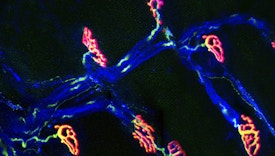
John Flanagan is a professor in the Department of Cell Biology and the Program in Neuroscience at Harvard Medical School. His undergraduate training was at the University of Oxford in biochemistry, followed by a Ph.D. on immunoglobulin gene organization at the University of Cambridge. After a postdoctoral fellowship in cell-cell signaling with Philip Leder in the genetics department at Harvard Medical School, he joined the faculty at Harvard and began to work on the molecular basis of neural development.
The broad interest of the Flanagan lab is to understand how cells signal to one another through cell surface receptors and their extracellular ligands, particularly in the formation of the precise and complex pattern of connections that characterizes the nervous system. In addition to normal development, the lab is interested in neurodevelopmental conditions including autism, as well as neurodegenerative disease and regenerative strategies for repair.
Flanagan developed soluble receptor techniques that have since been widely used to identify and characterize cell-cell signaling molecules. His group identified some of the first developmental axon guidance cues, members of the ephrin family, and showed that they provide gradients of positional information that guide the formation of neural topographic maps. When connections in the adult central nervous system are lost due to injury or disease, regeneration is minimal, creating a major clinical challenge. Flanagan’s group also identified the first receptors for a major class of regeneration inhibitors, the chondroitin sulfate proteoglycans, identifying new therapeutic targets for nervous system regeneration.
